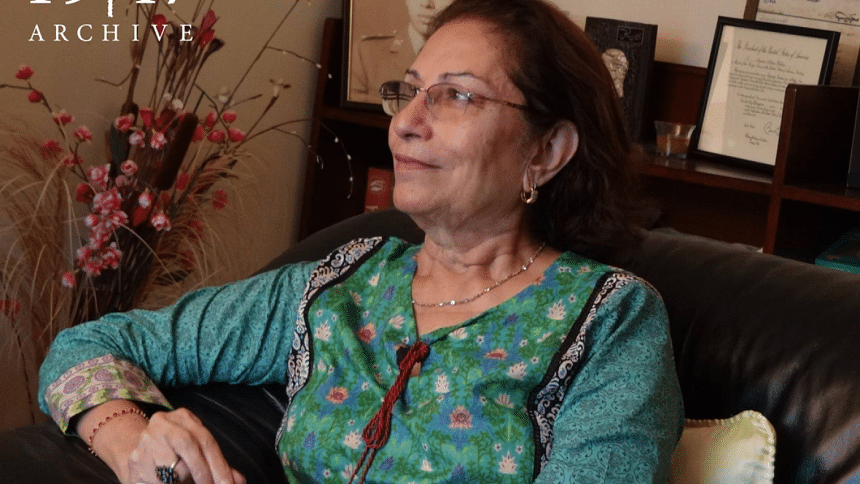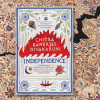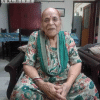Restorying Partition: Sabuha Khan

Currently Residing: Unknown
Age in 1947: Not available
Location in 1947: Unknown (did not migrate)
When Partition occurred Sabuha Khan's parents were divided on whether to leave Delhi and Rohtak permanently. "My mother wanted to migrate to Pakistan and leave everything in India behind. My father, on the other hand, was not in favor of leaving his ancestral heritage and properties behind. They eventually decided to migrate when my mother's properties in Delhi were set on fire. Someone had written on the wall in blood that we were the next targets."
Mrs Khan was born in 1945 to an Urdu-speaking family in Delhi. Her father was a landlord with landholdings in Rohtak, as well as an officer with the British Indian police. Her father's family were settlers from Afghanistan. After her parents' marriage, the couple moved to Delhi. Before Partition, Mrs Khan, the youngest of the family, was raised in their residence in Pul Bangash under a joint-family system.
From her very brief childhood in Delhi, Mrs Khan remembers that the family owned a cow, and she was quite attached to it. Mrs Khan says: "There was a large road across our house, and there used to be a series of shops [ground floor] and apartments [first floor]. My mother's family used to own seven of them and had rented them out to people. Hindu, Muslim and Sikh families used to live together in the mohallah, and there was no incident of communal discords before Partition.
Mrs Khan's maternal uncle was in the army, and he had been posted in Rawalpindi during Partition. Her family relocated to Rawalpindi in two trips. "In the first trip my sister, who was 15 at the time, and brother, who was 12, left Delhi with my maternal uncle. My parents, paternal grandmother and myself followed them two months later," she says. "My siblings lived at the Walton Refugee Camp in Lahore for a few days before leaving for Rawalpindi, and they were too traumatised to talk for several months about their journey."
Two months later, Mrs Khan, her parents, and paternal grandmother were escorted to the Old Fort Refugee Camp in Delhi in an army truck arranged by her maternal uncle. They lived at the refugee camp for 20 days. "It was a living nightmare for my family. My father, who was 50 at the time, could no longer stand on his feet, and my paternal grandmother had become terminally ill. She was admitted into the Red Cross hospital not too far from the camp," Mrs Khan shares. Mrs Khan was separated from her grandmother, as they left for the railway station without her. "To this day I don't know whether she survived or died in that hospital. No one in our family had the means to find out," she says.
During their journey to Lahore, their train had stopped in the middle of dense forest at night. "A pregnant woman in the train went into labour and her screams were echoing in the train all of a sudden. Her husband was helpless as no passenger would help. My mother stood up to help deliver the baby, even though she had never done that before. While trying to take her off the train, the guards refused to take any responsibility for them if the train came under attack or starts to move. She handed me to the woman's husband, and wrote down my maternal uncle's address in Rawalpindi for him, saying in case she doesn't return to the train, take her child and husband at the given address." Mrs Khan's mother helped the woman deliver a baby boy in the forest, and managed to return to the train safely. "When she got back on the train with the woman and her newborn, everyone started chanting slogans. It infuriated my mother because none of these people came off of their seats to help this woman when she was in pain. It's an important memory, which enabled me to believe how strong she was."
Their train came into Lahore via the Wagah Station and went straight to Rawalpindi, where they were reunited with her uncle uncle. He was allotted a portion of Malik Dogar Singh's house at Abdal Garh on Nehru Road. "That house had been divided into three portions, each portion was allotted to an army officer stationed in Rawalpindi. My uncle was one of them. We lived in that house for nearly two decades." Twenty days after her family's arrival in Rawalpindi, Mrs Khan's father passed away. Mrs Khan and her siblings were raised by her mother and maternal uncle Mrs Khan vividly remembers the sound of bells emanating from the Gurudwara next to their new home. "I used to play hide and seek, with my siblings, and remember hiding in the cupboards a lot," she says. Mrs Khan obtained her college education in Rawalpindi, at the Government School for Girls and CB College. She was very active in dramatics, debating and played sports like netball, badminton, and long jump. She was a champion female student of badminton in Punjab. She also won the Maulvi Abdul Haq gold medal in a state speech competition. After matriculation and intermediate in the sciences in 1963, Mrs Khan completed her bachelor's degree in Islamic Studies and Psychology, followed by a master's degree in Urdu Literature from Punjab University in 1967, under a scholarship.
The same year she was married in an arranged marriage by her mother. She moved with her husband to Dhaka, where he was posted, and then lived in Karachi for a year, where she taught at a school for some time. In 1972, she joined Pakistan state television as a news anchor and worked with there for 12 years. In 1998 Mrs Khan began a beauty salon business in Karachi, which she continues to run nowadays.
Mrs Khan has two sons. Both of them are engineers settled in the United States and Canada. In 2004, Mrs Khan visited her birthplace in India for the first time, at the Pul Bangash Street in Delhi. "I recognised the house immediately after noticing the black and white tiles," she shares. Mrs Khan has written a biography of her mother's life in India and about Partition titled Dilli Se Defense (Delhi to Defense). She has authored travelogues of her own trips to India, Canada and the United States in Urdu.
Interviewer: Fakhra Hassan
Camera Person: Fakhra Hassan
Archivist: Karyn Bellamy-Dagneau
Story Donor/Sponsor: Mayur P. and Bradford Baugh
Photo and content sourced with permission from The 1947 Partition Archive (www.1947PartitionArchive.org)









Comments